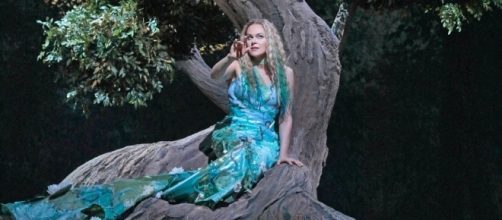Opera gets no better than Antonín Dvořák’s Czech-language “Rusalka” (water nymph). This masterpiece, popular worldwide, inexplicably took 92 years to reach Metropolitan Opera, where the Company mounted its premiere production in 1993. After just 27 performances, it’s somehow time to replace it with Director Mary Zimmerman’s fantasy take on this adult fairytale, which opened Feb. 2 for eight performances. Soprano Renée Fleming has sung the role—a personal favorite—at the Met fully 18 times; Latvian soprano Kristine Opolais does title honors now.
British maestro Sir Mark Elder conducts.
Opera fairytale?
So an opera about a water nymph just replays Disney’s “Little Mermaid” (1989), right? The short answer is No. Renée Fleming elaborated in her Nov. 4, 2016, Newark recital, “This is opera, folks. Everybody dies.” Well, not really; she fibbed a little bit. Just the nameless Prince actually dies by opera’s end. Rusalka wants to but can’t. Antonín Dvořák’s librettist, Jaroslav Kvapil, used the fairytales of Karel Jaromír Erben and Božena Němcová as his starting point.
Opera music for different worlds
Known in this country chiefly for his nine luscious symphonies, several of Antonín Dvořák’s ten operas regularly appear on Eastern Europe’s lyric stages.
The music of Act I, set in and around Rusalka’s watery home, is all other-worldly shimmering gossamer. This starkly contrasts with the opening of Act II, whose music is totally human—first folksy, then a more-sophisticated sonic tapestry in the scenes featuring the unnamed Prince and Foreign Princess, with whom the now-mute Rusalka clumsily interacts, fish-out-of-water style.
Act III melds both musical styles.
Opera at its best
“Rusalka” fuses the best of operatic voice, evocative ballet and a symphonic score. Metropolitan Opera certainly engaged top-notch singing actors for this new production. American tenor Brandon Jovanovich, the unfaithful Prince, sang with heroic strength and ping in gleaming brilliance tempered by amorous warmth.
His Act III pianissimo kiss-me-to-death plea is the stuff of tear-welling, throat-lumping poignancy, the most heartbreaking sounds of the day. Ms. Opolais spins gloriously radiant, luminous lines, somehow delivering Act I’s “Měsíčku na nebi hlubokém” (Song to the Moon) both tentatively and self-assuredly. Her desperate Act II plea for help is as ravishing as it is riveting.
Opera of high octane
As Rusalka’s father, American bass-baritone Eric Owens’ Vodník (water elf) utters rich, achingly plangent, reverberating warnings, his Act II lament paternally sorrowful. American mezzo-soprano force-of-nature Jamie Barton (Ježibaba), launches her magnificently voluptuous voice and blasts a wicked, maniacal cackle to blood-curdling effect.
Swedish soprano Katarina Dalayman, all aglitter in crimson velvet and rhinestones, declaims the Foreign Princess’ alluring observations and princely reproofs keen as a glistening knife slicing through the thickest darkness.
Opera requisites
An orchestra, chorus and conductor propel lyric works forward to their inevitable conclusion. World-class Metropolitan Opera Orchestra wove a sumptuous lyric tapestry throughout, and Metropolitan Opera Chorus—who received no curtain call, perhaps for singing entirely offstage—provided flawlessly varied moods under Sir Mark Elder’s capable lead.
Opera as eye candy
Director Mary Zimmerman’s artistic team twists naturalism into a catchy semi-surreal look, with Daniel Ostling’s colorful sets, Mara Blumenfeld’s imaginative costumes and ingenious atmospheric lighting by T.J.
Gerckens. Choreographer Austin McCormick creates fleet ballet sequences in Acts I and III for mischievous wood nymphs. In Act II, six elegant couples deftly execute a vigorous, forceful Polonaise. Then, when Vodník suddenly appears, these recede to a darkened backstage where they quietly carry out a subtle, slow-motion dance. Sumptuous.
“Rusalka,” by Antonín Dvořák; closes March 2, Metropolitan Opera, Lincoln Center Plaza, New York, N.Y.

